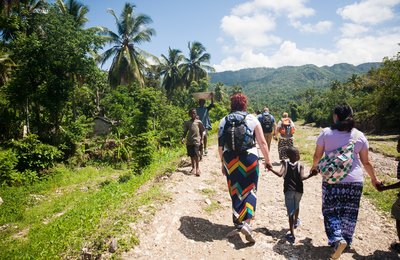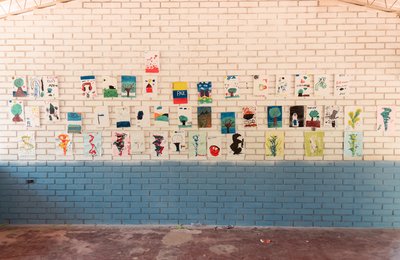The Teso Peace and Human Rights Development Initiative (TEPEHURDI) was founded in 2001 by the Reverend Michael Ikwara. It focuses on promoting community involvement in enhancing justice, reconciliation, peace, culture and good governance in Kenya.
Conflict prevention and resolution programmes
Peace building and Mediation
The Western region has experienced territorial confrontations between communities for centuries. Aggravated by the colonial system, they have become more complex and varied in recent years as a result of land displacement, unequal access to resources and political representation, environmental strain and youth unemployment.
Conflicts include industrial confrontations between sugar cane farmers and factories, land-based conflicts, militia groups, and political actors.
Many low-level conflicts in Kenya escalate into communal ones, because of historical differences being grafted onto contemporary disputes, as well as because of the provocation of leaders who benefit from strong, conflictual "tribal" identities and economic hardship in order to rally support. For this reason, mediation and pro-active, pre-emptive peace building efforts can have a big impact on preventing small conflicts turning into big ones.
TEPEHURDI’s Peace building and Mediation programme seeks to build relations between families and communities, and improving local coping mechanisms to resolve disputes before they escalate. It works to help foster a relationship between residents in the Mount Elgon region and their community and government leaders, as well as running a "people-to-people" reconciliation project in the Cheptais district.
Women and Youth Empowerment
In rural areas of Western Kenya, women and children suffer most from underdevelopment and injustice. Traditional cultures of the communities in Western Kenya tend to marginalise women and the young. Women also bear responsibility for the family, and are expected to provide for their needs, in many cases with little support from the father. Young men and women often struggle to gain employment, even with qualifications, and become disillusioned. This leaves them susceptible to manipulation by politicians and community leaders who seek to use them to further their own ends. Young men are often paid to cause chaos and violence when it favours leaders and politicians.
TEPEHURDI’s Women and Youth Empowerment programme aims at providing encouragement and capacity to those left behind. Its main projects are:
- Youth Modelling & Empowerment - Teso North
- Women Modelling & Empowerment - Teso North
Community Integration
One of the underlying causes of conflict and underdevelopment in the Western region is the lack of interaction and integration between the different ethnic communities.
Western Kenya, like many parts of the country, suffers from long-term latent conflicts between ethnic groups and sub-groups. The ongoing struggle over resources and political influence affects all sectors of society, though those who bear the brunt are the rural poor, women and farmers. An important aspect of the conflict between the different communities is that a great proportion of the conflicts are the result of misinformation and mistrust.
Indeed, despite the outwardly simple explanation, ethnic tensions are the consequences of deep-rooted underlying factors related to the nature of politics in Kenya, which is overwhelmingly tribal based. The division between a community and its political leaders is indistinguishable. For most people in Kenya, political representation is possible only via a member of one's own tribe. This causes a great sense of resentment among minority communities, who feel that their numerical disadvantage leaves them without any political voice. Furthermore, Kenyan politics is viewed by many as a zero-sum game of winners and losers, where the winning community has access to all of the state’s resources. This makes elections extremely high-stakes events, a view which politicians naturally seek to reinforce.
Poor education levels among rural communities means that many people do not fully understand their role as citizens, the rights that they have and their obligations during the democratic process. This makes them open to manipulation by politicians, who often use negative campaigns based on ethnic identity to get support. Around election time this ignorance is played out, with communities becoming divided based on the alliances of politicians and viewing the “others” as enemies.
In addition to this, the area suffers from high poverty levels and huge levels of unemployment. In this context, desperate people are willing to believe the rhetoric of politicians who state that unless a member of their own ethnic group is in power they will not receive any of the benefits from the state. Communities thus begin to view one another with suspicion. Undoubtedly it is the youth who are the most affected by the high levels of poverty and unemployment and therefore most susceptible to being used to cause chaos during election periods.
TEPEHURDI’s Community Integration programme seeks to promote interaction and sharing between communities, in particular promoting and empowering minority and marginalised communities that live throughout the region. Through giving people the chance to interact in a neutral space, it tries to bring about an increased level of understanding and respect between the communities.
Under this programme, TEPEHURDI has been running the following projects:
- Reducing Police Brutality and impunity by enhancing their interactions with members of the public - Teso North District
- Inter-ethnic Cohesion Project - Cheptais District
Culture, sporting and community projects
TEPEHURDI has successfully organised several other projects with peacebuilding at their heart. These include:
- Inter Ethnic Cultural Festivals and Sports: These activities are used because of their potential to gather many people together. Cultural festivals help to mitigate stereotypes and mistrust, with communities singing and eating together, developing a culture of dialogue and sharing their cultural skills and knowledge. Sport has also been successfully used as a way to kick-start cooperation.
- Pulpit peace programme and exposure tours: Chuches are an important meeting place in Kenya, but they also unknowingly create conflict. The Pulpit Peace Programme brings Christian leaders together to help create a joint culture of peace by uniting denominations instead of looking for partisan differences.
- Mediation and cleansing: TEPEHURDI runs mediation groups and forums, bringing people together at traditional ceremonies while resolving disputes at the same time.









